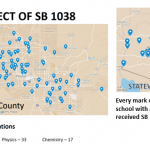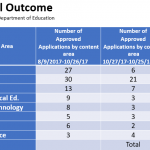Are you a trusted expert in your particular field who seeks to pass knowledge and truth on to others? Then you might just be a Maven. Are you a person who networks like crazy? – Maven
This past summer I was given the chance to study Computational Physics Modeling at Columbia University in New York. The experience rocked my mind to where we are going next in my field of physics. The class was through a partnership between the American Modeling Teachers Association(AMTA), STEM Teachers New York, and the National Science Foundation. During this three-week class, we wrote mountains of curriculum and learned how to code in a way that has never been attempted before. But more importantly above the science, I got the chance to connect with others in my field.
I had the chance to meet incredible teachers across the country and more importantly network. You see in our discipline; most physics teachers are alone at their respective institutions. Usually, there is one guy or gal who teachers physics now on most campuses. And because often times we are the scariest subject next to calculus, that person is left alone to their own devices; isolated and without the ability to collaborate effectively. However, what I learned after eating dinner with several physics teachers every night, was that the conversations never got boring and the thirst for connection was energizing. The idea storm I participated in each night was like watching an M. Night Shyamalan movie with a choose your own adventure ending all in one. I was learning quantum amounts of information because my colleagues were willing to share, and we were surrounded by people who understood us and what we do. Sometimes just finding those few people out there like yourself can make all the difference. I took it all in like a sponge. It was exhilarating talking shop with leaders in my field, sharing war stories about best practices, and not so best practices. Finally, I was getting professional development that mattered to me. But more than the science, one of the biggest take aways were that we need more people to step up and be leaders in our field. Inertia to help move the public policy of science forward.
Then one night at dinner I was asked if I knew what a Maven was. I said I did not, but now I’m listening and you have my undivided attention. One of our founding members of the AMTA, a professor who I admire a great deal explained to me that we need more Mavens in education. She explained we need not just more leaders, but folks with the ability to bring others together.
In sociology and network theory, a Maven is someone who has quite the influence on others in their network and circle. They are people who propagate information and know how. They are so useful in fact that they are nearly pathologically useful. According to the famous author Malcolm Gladwell, Mavens have the ability to start word of mouth epidemics due to their knowledge base, social skills, and ability to communicate. They are the sparks that start the fire, and the messengers of change in their circles. They have the ability to sew connections into the fabric of organizations and they are the “go to person” in their realm. If you’re reading this article, then you’re already more than likely a Maven, and I say that because you too are more than likely a seeker of knowledge yourself if you’re reading some of these blog posts.
In our field, what we discussed was that we need more people who could be those connectors, the ambassadors, the “go to person”. And this need is not just for science. We need them in general as a whole to be good ambassadors of our education profession. People willing to leave their comfort zone and talk with community leaders, and legislators. People willing to bridge multiple disciplines and demographics to start fires of change. People who can serve as information hubs and connect us all with new information, and make a habit of introducing new people who work or live in different circles to our cause.
We need people now more than ever to pop out of the cubical farm/classroom jungle and connect with our communities on a level that is pathologically useful. As a coach, I hear all the time that Together Everyone Accomplishes More, and though it’s corny, it is so very true. Teachers could be a force for change in the education arena if we all took the time to reach out to people outside of our current circles and shared our common experiences on a larger scale.
Last week, I hosted a state legislator for Take Your Legislator to School day. A person who I adore and think highly of. Her message to me was one in the same. We need teachers willing to “Maven Out” if we are to effect change in this state. Did you know it only takes around 15K votes to win in a district in Maricopa County? We are talking districts with populations around 250-300K people. Can you imagine if an entire district teacher population of 3000 teachers voted for something or reached out to just 2 other people to vote with them? That is true power of change right there, but we need to connect to people to make it happen. We need “stickiness factor” in our message. The ability to make a message stick and resonate like a 5megahertz pressure wave in a glass factory. We need to breach our circles of familiarity and take our message of hope and learning to another level. Does your local business across the street know people in your school? Are your neighbors connected to what you do? It’s time to connect on larger scales.
Our physics team realizes that the decline of our discipline in high schools is a real issue. In states like ours where there are only 159 of us left, the problem is catastrophic in nature. However, what if we could get help from Wisconsin who is going thru a similar problem, or New York where they solved many of the issues we are facing. That level of connecting is what will make us stronger, together… It comes down to Mavens. People who make connections and can cause viral epidemics of change. People that are experts in their field who can share their knowledge and wisdom with others. Folks who can communicate and bridge gaps so that together we can accomplish more. The drive to spur new teacher leaders is one we should all participate in. Whether it’s the young rookie teacher or the older more seasoned veteran, we all must help our people unleash their inner Maven.

![Atlas_V_launches_with_MAVEN_(201311180004HQ)[1]](http://www.storiesfromschoolaz.org/wp-content/uploads/2017/09/Atlas_V_launches_with_MAVEN_201311180004HQ1.jpg)








Comments 8
Wow, Mike, you managed to connect two of my favorite things. First, I very much value learning content – either new material or reviewing old material – in my language arts, math, science, and engineering – the subjects I teach. I don’t need a reason beyond the learning even though almost all of it somehow gets into the classroom. I usually like that much more than learning pedagogy. Second, I’m a Malcolm Gladwell fan and, I think, am completely caught up on his books. I’m also listening to his Revisionist History podcast, which is fantastic.
I enjoyed this post very much. I know my comment doesn’t address the need to be mavens, but getting off the subject is also one of my favorite things.
HII Thanks Sandy, I have worked on this piece for the last month trying too get the thought down. I know we talk about teacher leadership all the time. But the other component is the connections and networking. I think this aspect of our field is as important as knowing our content area.
This is a powerful call to action, Mike. I hope that I am learning to become a maven. As Sandy mentioned in his comment, I love learning for learning’s sake but I also love to learn with like-minded people. Also a huge Malcom Gladwell fan. Sandy, I’ve got to get caught up on the podcast!
We recently implemented PLCs and suddenly all of our singletons are on full display. We are so looking for ways for our physics, engineering, choir, autos, etc teachers to connect. We know we work better when we are out of our pockets, but how do we make those connections meaningfully in a one high school district? We are looking at growing our connections to reach out and support teachers as they become experts and leaders in their field. As always, an inspiring story from you Mike!
Hi Jaime,
Send me a e-mail and Ill send you info on our program to get STEM and CTE Teachers 2000$ scholarships.
Mike
Many high schools in Greater Phoenix are isolated! Even if they are in multi-high school districts. How can singletons connect? Perhaps the Maricopa County Educational Service Agency (MCESA) can be convinced to hold a yearly one-day professional development event by SUBJECT MATTER: physics, chemistry, biology, engineering, etc. meet separately for half-day workshops by teacher-leaders. This has been done for many years in a county west of Chicago; I learned about it from Jim Stankevitz, a physics teacher-leader at Wheaton-Warrenville South High School. Jim has led sessions on Modeling Instruction in physics — in February. This 1-day professional development has vast and excellent ramifications; many participating teachers register for 2-week summer Modeling Workshops led by Jim Stankevitz and his colleagues at his high school, after getting a taste of it in Feb. Numerous local leaders in science have been developed by this process, as Modeling Workshops have expanded to chemistry and biology. Jim’s email is jimstanke@COMCAST.NET, if you would like to prepare a vision statement to present to MCESA.
Thanks for sharing this blog, Mike. I think sometimes we retreat to our classes, our schools and look for ways to escape, when in reality we need to have the courage to be Mavens and step out, step up and make connections to move our profession forward.
It is WAY past time we teachers, the highly educated experts in education, spoke up and became leaders, MAVENS, in our field. When we choose to do this en masse the public perception of “those who can do, those who can’t, teach” will shift. Well stated, Mike!